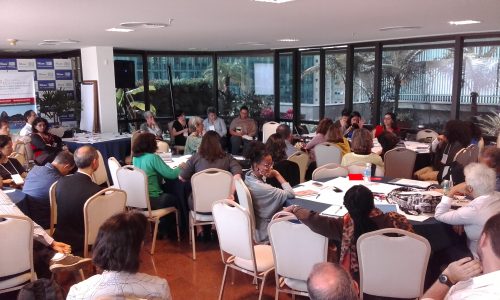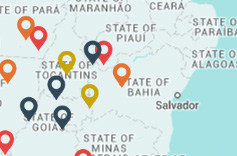 The first international meeting of the Network of Independent Funds for Social Justice, created in 2012, was held in Rio de Janeiro from 8 to 10 July. It gathered funds, foundations and activists from a number of countries to discuss the steps needed to construct a collective strategy to strengthen the field of philanthropy for social justice in Brazil and Latin America more widely.
The first international meeting of the Network of Independent Funds for Social Justice, created in 2012, was held in Rio de Janeiro from 8 to 10 July. It gathered funds, foundations and activists from a number of countries to discuss the steps needed to construct a collective strategy to strengthen the field of philanthropy for social justice in Brazil and Latin America more widely.
Philanthropy for social justice, it was emphasized, is philanthropy that aims to eliminate the causes of injustice and not just to reduce the symptoms, guided by, as Martin Luther King said, ‘the fierce urgency of now’. The six funds and three community foundations that are part of the Network work at the root of the problems, from an advocacy perspective as well as supporting grassroots organizations and activists whose rights need to be protected.
To eliminate the causes of injustice we have to deal with the culture of inequality, which, in Brazil, shapes the way we look at one another and causes structural racism. This is what justifies exclusion and provides arguments to support the idea that some have more rights than others. This idea remains very strong in countries like Brazil, where the heritage of slavery is far from being eradicated. The first day of the meeting led to a discussion about the current Brazilian political context, providing an opportunity to reflect upon topics such as racism, violence, the developmental state and the rule of law, with panellists Átila Roque of Amnesty International and Sergio Leitão of Instituto Escolhas.
How can we contribute to putting an end to the legacy of slavery? One of the conclusions of the meeting was that the Network should establish new narratives to win hearts and minds in favour of eliminating the culture of inequality and racism, helping to generate a collective revulsion against it. In fact, I believe this must go beyond the Network, involving all in the field of philanthropy for social justice working together to promote awareness of the relevant work done by civil society.
The idea of philanthropy for social justice is still new in Brazil, so there is a long way to go in raising awareness about the importance of independent funds and foundations supporting organizations and individuals working on the frontline of the most serious social problems. Engaging people means showing them that by supporting civil society organizations they are actually strengthening democracy and benefiting the country. Such work increases the number of people with rights, which is the essence of a more egalitarian society.
Social justice philanthropy funds and foundations are associated with inclusive governance, absolute transparency of practice, and public and unbiased grantmaking criteria. They raise funds to make grants solely to support projects from the grassroots and civil society organizations; they do not execute projects of their own, which, in Brazil, is a common characteristic of corporate and more traditional philanthropies.
It is impossible to deny the advances in the attainment of rights since 1988, when Brazil was granted a new constitution. Examples mentioned included the promulgation of the Statute of the Child and Adolescent, the creation of the Maria da Penha law in defence of women’s rights, the demarcation of indigenous lands, the formal consent to the civil union of persons of the same sex and the domestic work law.
However, in Brazil we are now facing the challenge of ensuring the preservation of those rights in the face of a conservative Congress and a society that can countenance such major setbacks as the reduction of the age of criminal responsibility. Despite the advances made, Brazil has still not reached a balance between economic and social interests and violence still kills 56,000 people a year (30,000 young people between 15 and 29 years old, 77 per cent of them black).
As funders, we can play an important role in helping representatives of organized civil society take a clear stand in the face of these conflicts, united behind strategies that are adequate to the threats involved. This international meeting was an important step towards developing such strategies.







